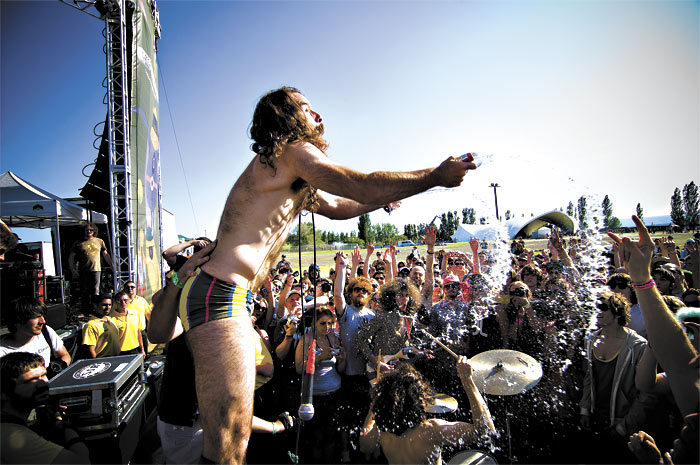When it comes to packing bodies into rock clubs, it doesn’t hurt to have a reputation for putting on kinetic live shows. Tel Aviv, Israel’s Monotonix is a punk-informed trio that’s amassing a devoted international fan base thanks to a touring schedule that keeps them on the road nearly 10 months of the year. From the stage, the band blows minds and eardrums with its primal, Sabbath-inflected cacophony and in-your-face delivery. During a set at 2008’s Bumbershoot, they got themselves shut down by the fire marshal a mere 15 minutes into their set. Three weeks later, they returned to play back-to-back sold-out shows at the Sunset and the Comet.
Frontman Ami Shalev is as likely to wrap his microphone cord around an unsuspecting fan as he is to loop it around a nearby ceiling rafter and swing fearlessly. Onstage, he tosses his tightly-curled mane often, howling and spitting beer, which conjures images of Karen O’s unpredictable impulses. Offstage, he agilely climbs street lamps outside venues with a level of audacity and uncorkable enthusiasm that would make Iggy Pop proud.
Shalev isn’t conducting this gleefully confrontational mission alone. Guitarist Yonatan Gat can’t be caged by the stage, miraculously avoiding smacking people with his instrument while dashing through the crowd, leaping atop bars, or straddling tables—while churning out riffs that are equal parts grunge-sludge and Thin Lizzy–channeling harmonics. Drummer Haggai Fershtman takes it even further: Crowd-surfing as audiences hold his drums aloft, he bashes away with precision and power that seem Jedi-like, given his precarious balance. Random instruments are often lit on fire, depending on what Monotonix can get away with before the authorities are summoned (drumsticks or cymbals usually suffice). You see why the band was shut down at Bumbershoot for acting too unruly.
Committing atomic energy of this caliber to tape is an entirely different beast of burden, though. “We don’t set things on fire or crowd-surf drums in the studio,” acknowledges Gat. “On record it needs to fit all moods; live, it just needs to fit the moment.”
On the group’s latest release, Where Were You When It Happened?, Monotonix toes the line between raw execution and studio trickery. Shalev’s vocals are often lost in the flurry of his acrobatic live show, but here they come to the front. On “I Can’t Take It Anymore,” Shalev evokes Mudhoney’s guttural growls, while the disarmingly down-tempo “Something Has Dried” finds him treading toward mournful balladry. The garage-punk blast of Gat’s guitar becomes more salient too, anchoring “My Needs” with impressive continuity and a deeply distorted fuzz tone.
After forming in 2005, Monotonix began a relentless touring regimen, eventually signing to Drag City Records in 2008 and recording the EP Body Language with help from Bay Area producer Tim Green. Where Were You When It Happened?, also recorded with Green, is the group’s first proper full-length, conceived during a much-needed sabbatical in New Orleans last year and executed at Green’s Louder Studios in San Francisco. Arriving with six songs in mind, the trio conjured six more while soaking up the rich history of their temporary Louisiana home. “There isn’t a brass section on the album,” says Gat. “But I’m sure the jazzy, weird vibe of that city made its way into the music somehow.”
Indeed, Where Were You When It Happened? is more brash than brassy, sonically reflective of Monotonix’s unbridled approach. “The main things we did to bring out the live sound and feel on the record were running Yonatan’s guitar through three amps at once and having Ami sing in the tracking room with the rest of the guys for every single take so they could feel more like they were playing a show,” explains Green. “I think there were one or two songs where we kept the original vocal that he sang.” The end result audibly balances their individual musical roles, which suits a tight-knit act bonded by a road-warrior lifestyle.
The title was Shalev’s idea, originally meant as a humorous way of asking people if they remember historic events. Gat augments this with his own interpretation: “It’s about becoming so blinded at a certain period of time that you don’t even remember where you were,” he says. “But it’s also this joke we have about people escaping Israel at times of war, only to come back when it’s peaceful again and complain. Where were you when the bombs fell?”
Clever, politically charged titles aside, Monotonix is ultimately more about the full-contact sport of its live performances. When they come to Neumos this Saturday, the games will begin on the floor. The band has already made arrangements to play off the stage to be closer to the crowd.








